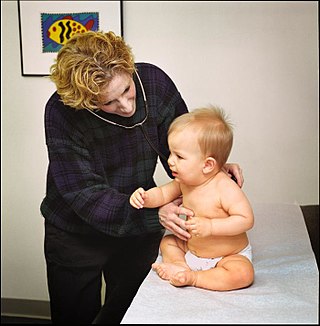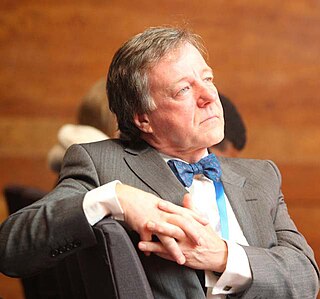Related Research Articles

A physician, medical practitioner, medical doctor, or simply doctor is a health professional who practices medicine, which is concerned with promoting, maintaining or restoring health through the study, diagnosis, prognosis and treatment of disease, injury, and other physical and mental impairments. Physicians may focus their practice on certain disease categories, types of patients, and methods of treatment—known as specialities—or they may assume responsibility for the provision of continuing and comprehensive medical care to individuals, families, and communities—known as general practice. Medical practice properly requires both a detailed knowledge of the academic disciplines, such as anatomy and physiology, underlying diseases, and their treatment, which is the science of medicine, and a decent competence in its applied practice, which is the art or craft of the profession.

A general practitioner (GP) or family physician is a doctor who is a consultant in general practice.

General practice is personal, family, and community-orientated comprehensive primary care that includes diagnosis, continues over time and is anticipatory as well as responsive.

Family medicine is a medical specialty within primary care that provides continuing and comprehensive health care for the individual and family across all ages, genders, diseases, and parts of the body. The specialist, who is usually a primary care physician, is named a family physician. It is often referred to as general practice and a practitioner as a general practitioner. Historically, their role was once performed by any doctor with qualifications from a medical school and who works in the community. However, since the 1950s, family medicine / general practice has become a specialty in its own right, with specific training requirements tailored to each country. The names of the specialty emphasize its holistic nature and/or its roots in the family. It is based on knowledge of the patient in the context of the family and the community, focusing on disease prevention and health promotion. According to the World Organization of Family Doctors (WONCA), the aim of family medicine is "promoting personal, comprehensive and continuing care for the individual in the context of the family and the community". The issues of values underlying this practice are usually known as primary care ethics.

Medical education in Australia includes the educational activities involved in the initial and ongoing training of Medical Practitioners. In Australia, medical education begins in medical school; upon graduation it is followed by a period of pre-vocational training including Internship and Residency; thereafter, enrolment into a specialist-vocational training program as a Registrar eventually leads to fellowship qualification and recognition as a fully qualified Specialist Medical Practitioner. Medical education in Australia is facilitated by medical schools and the medical specialty colleges, and is regulated by the Australian Medical Council and Australian Health Practitioner Regulation Agency (AHPRA) of which includes the Medical Board of Australia where medical practitioners are registered nationally.

The Royal College of General Practitioners (RCGP) is the professional body for general (medical) practitioners in the United Kingdom. The RCGP represents and supports GPs on key issues including licensing, education, training, research and clinical standards. It is the largest of the medical royal colleges, with over 54,000 members. The RCGP was founded in 1952 in London, England and is a registered charity. Its motto is Cum Scientia Caritas – "Compassion [empowered] with Knowledge."

The Royal Australian College of General Practitioners (RACGP) is the professional body for general practitioners (GPs) in Australia. The RACGP is responsible for maintaining standards for quality clinical practice, education and training, and research in Australian general practice. The RACGP represents over 40,000 members across metropolitan, urban, rural and remote Australia.
Healthcare in England is mainly provided by the National Health Service (NHS), a public body that provides healthcare to all permanent residents in England, that is free at the point of use. The body is one of four forming the UK National Health Service, as health is a devolved matter; there are differences with the provisions for healthcare elsewhere in the United Kingdom, and in England it is overseen by NHS England. Though the public system dominates healthcare provision in England, private health care and a wide variety of alternative and complementary treatments are available for those willing and able to pay.

William Norman Pickles CBE was a British physician who worked as a general practitioner and was the first president of the Royal College of General Practitioners in 1953.

Michael David Dixon, (Hon) is an English general practitioner and current Head of the Royal Medical Household. He is Chair of The College of Medicine and Integrated Health and Visiting Professor at the University of Westminster.

John Henderson Hunt, Baron Hunt of Fawley was a British general practitioner (GP) who, in 1952, co-founded the College of General Practitioners. In 1967 the royal prefix was approved and the college was renamed the Royal College of General Practitioners (RCGP). He became its president in the same year.
Chaand Nagpaul is a British doctor who works as a general practitioner and was Chair of the Council of the British Medical Association from 2017 to 2022. Nagpaul took over as chair from Mark Porter in June 2017.
Sir Denis John Pereira Gray is a retired British general practitioner. He worked for 38 years in the St Leonard's Medical Practice, Exeter, and continued as a research consultant until 2018, following his father and grandfather.
John Calum Macdonald Gillies FRSE is a medical doctor who worked as general practitioner (GP) and who is the Depute Director of the Scottish School of Primary Care. He was formerly the chair of the Scottish Council of the Royal College of General Practitioners (RCGP) from November 2010 to November 2014.
Richard Vautrey is a doctor who is President of the Royal College of General Practitioners, having formerly been Chair of the British Medical Association's (BMA) General Practitioners Committee. He is a nationally elected member of the BMA Council. He works as a general practitioner (GP) in Leeds and he is an assistant medical secretary of Leeds Local Medical Committee.
John William Chisholm is a British medical doctor who worked as a general practitioner (GP). Chisholm was chairman of the British Medical Association's General Practitioners' Committee (GPC) between 1997 and 2007.

David Wrigley is a British medical doctor who works as a general practitioner (GP) in Lancashire and is the deputy chair of the British Medical Association (BMA) Council. He is a member of the Labour Party and Socialist Health Association.

Fraser Macintosh Rose,, known as Fraser Rose, was a physician who worked as a general practitioner (GP), and is best known for co-founding the Royal College of General Practitioners (RCGP).
Ekkehard von Kuenssberg CBE was a German-born physician who made his career in Scotland. He was chairman and later president of the Royal College of General Practitioners and was appointed as its Wolfson Travelling Professor.
Ian Greville Tait was a British medical doctor who spent most of his career as a general practitioner (GP) in Aldeburgh, Suffolk. He was a major figure in the modernisation of general practice in the UK during the 1960s and 1970s. According to Stephen Lock, former editor of the BMJ, Tait's work "helped transform general practice into a major medical specialty, giving family physicians a status equivalent to hospital consultants."
References
- ↑ "Dr Chaand Nagpaul elected as new leader of the nation's GPs" (Press release). British Medical Association. 18 July 2013. Retrieved 29 January 2015.
- 1 2 3 "People of Today - Laurence Buckman". Debrett's . Retrieved 29 January 2015.
- 1 2 Freedland, Michael (11 June 2009). "He won GPs their big bucks". The Jewish Chronicle. Retrieved 29 January 2015.
- ↑ "Officers". jewishmedicalassociationuk.org. Retrieved 24 March 2018.